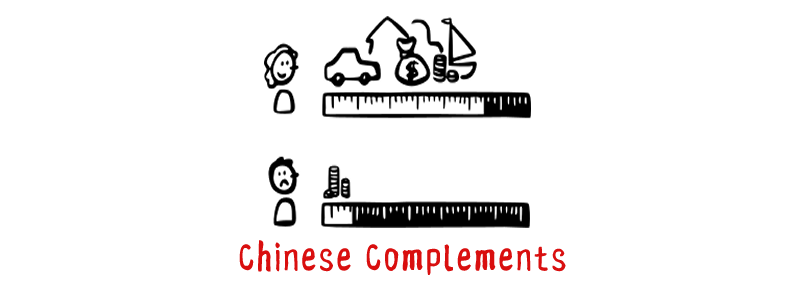A complement is a word or phrase following a verb or an adjective that provides more information to the verb phrase. Complements are super common in Chinese. It can be one character, a phrase, or a sentence. Complements provide additional explanations associated with verbs, such as degree, result, direction, or possibility.
6 Commonest Complements in Chinese
| Type of Complement | Verb/Adj. | Particle | Complement | English |
|---|---|---|---|---|
| 程度补语 chéngdù bǔyǔ (Degree Complement) | 大 dà big | 得 de | 很 hěn very | very big |
| 累 lèi tired | 死了 sǐle die | extremely tired | ||
| 可能补语 kěnéng bǔyǔ (Potential Complement) | 吃 chī to eat | 得 de | 完 wán finish | possible to finish the food |
| 吃 chī to eat | 不完 bù wán not finish | impossible to finish the food | ||
| 方向补语 fāngxiàng bǔyǔ (Direction Complement) | 放 fàng to put | 下 xià down | put it down | |
| 拿 ná to take | 出去 chūqù go out | take it out | ||
| 结果补语 jiéguǒ bǔyǔ (Result Complement) | 吃 chī to eat | 完 wán finish | finished the food | |
| 吃 chī to eat | 到 dào successfully | to eat (get) the food successfully | ||
| 状态补语 zhuàngtài bǔyǔ (State Complements) | 吃 chī to eat | 得 de | 很快 hěn kuài quick | eat fast |
| 想 xiǎng to think | 得 de | 很多 hěn duō many | think a lot | |
| 数量补语 shùliàng bǔyǔ (Quantity Complements) | 洗 xǐ to wash | 一次 yí cì one time | wash one time | |
| 喝 hē to drink | 三杯 sān bēi three cups | drink three cups of something |
Why Do We Use Complements
There are many ways to express the same sentence without using complements. So why do we use them? The answer is that it is a matter of language and habits. Just like in English, we ask people, “Would you like to grab a coffee?” instead of “Would you like to drink coffee?” It’s not about right or wrong; native speakers have their preferences. If you can use complements correctly, your Chinese will sound more natural and smooth.
Grammar Points for Complements
Degree complements & State Complements
- Degree complements 1 (HSK 3)
【Adj. + 得很 or 极了or 死了】
【Mental verbs + 得很 or 极了 or 死了】
【O,S + V + 得 + Adj】
- Degree complements 2 (HSK 5)
【Adj. + 得 + 不得了 or 慌 or 厉害】
【V or Adj. + 坏 or 透 +了】
【V or Adj. + 得 + Description】
- Degree complements 3 (HSK 7-9)
【Adj. or V + 得 + 不行】
【Adj. or V + 得 + 要命 or 要死】
【V + 个 + 不停】
Potential Complements
- Potential Complements 1 (HSK 3)
【Able to: V + 得 + RC】
【Not able to: V + 不 + RC】
- Potential Complements 2 (HSK 5)
【V + 得 or 不 + 下】
【V + 得 or 不 + 起】
【V + 得 or 不 + 动】
【V得 and V不得】
Direction Complements
- Basic Direction Complements (HSK 2)
【来, 去, 进, 出, 过, 回, 上, 下, 起, 开】
- Compound direction complements (HSK 3)
【进, 出, 过, 回, 上, 下, 起, 开】 +【来, 去】
- Extension Direction Complements 1 (HSK 4)
【Extension meaning of 上, 下, 起】
- Extension Direction Complements 2 (HSK 5)
【Extension meaning of 起来, V下去, V下来】
- Extension Direction Complements 3 (HSK 6)
【Extension meaning of 起来, 过来, adj.下去, adj.下来】
Result Complements
- Result Complements 1 (HSK 2)
【S + V + RC + O】
【RC:清楚, 错, 干净, 完, 懂, 好, 会】
- Result Complements 2 (HSK 3)
【到, 住, 走, 见, 破, 上, 着】
Quantity Complements
- Quantitative Complements 1 (HSK 2)
【V + Frequency complement】
【Adj. + Quantity complement】
- Quantitative Complements 2 (HSK 3)
【S + V + Duration Complement】
【S + V + Duration Complement + (的) + O】


